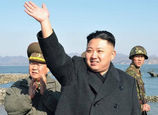
Leading IMF official says transition will be driven by quality of growth and further economic reform
A top International Monetary Fund official warned on Tuesday of the need for China to follow through on plans to shift its economy from an investment-driven model to one that relies on domestic consumption.
Zhu Min, one of the IMF's three deputy managing directors, said the key to this transition is economic reform and the quality, rather than the rate, of growth.
Chinese GDP grew 7.8 percent in 2012, higher than the government's adjusted forecast of 7.5 percent. Although it was China's slowest rate of economic expansion since 1999, the performance was among the strongest in the world. This year, GDP is expected to grow 8 to 8.25 percent.
Zhu pointed out that China's economy has been moving from a long-established focus on exports to investment. However, the 48 percent of Chinese GDP that investment accounted for last year was far too high, he told a seminar at Johns Hopkins University's Paul H. Nitze School of Advanced International Studies in Washington.
Overcapacity is a major challenge in China, where utilization of manufacturing resources has dropped to 60 percent, a level Zhu described as risky.
"Over-investment is a big concern and the quality of growth is a big concern," he said.
Zhu, who assumed his current post in July 2011, blamed over-investment for constraining the wages of Chinese workers. Household income remains a very small share of the country's economy, he said.
To maintain growth at or near current levels, China needs to keep moving toward consumption as its key economic driver, the IMF official said.
This goal is stressed in the 12th Five-Year Plan (2011-15), as well as the Government Work Report delivered last week by Premier Wen Jiabao at the National People's Congress.

















 How we face 'getting old before getting rich'
How we face 'getting old before getting rich'


![]()
